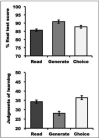Desirable Difficulties in Vocabulary Learning
- PMID: 26255443
- PMCID: PMC4888598
- DOI: 10.5406/amerjpsyc.128.2.0241
Desirable Difficulties in Vocabulary Learning
Abstract
In this article we discuss the role of desirable difficulties in vocabulary learning from two perspectives, one having to do with identifying conditions of learning that impose initial challenges to the learner but then benefit later retention and transfer, and the other having to do with the role of certain difficulties that are intrinsic to language processes, are engaged during word learning, and reflect how language is understood and produced. From each perspective we discuss evidence that supports the notion that difficulties in learning and imposed costs to language processing may produce benefits because they are likely to increase conceptual understanding. We then consider the consequences of these processes for actual second-language learning and suggest that some of the domain-general cognitive advantages that have been reported for proficient bilinguals may reflect difficulties imposed by the learning process, and by the requirement to negotiate cross-language competition, that are broadly desirable. As Alice Healy and her collaborators were perhaps the first to demonstrate, research on desirable difficulties in vocabulary and language learning holds the promise of bringing together research traditions on memory and language that have much to offer each other.
Figures





Similar articles
-
Repetition priming in picture naming and translation depends on shared processes and their difficulty: evidence from spanish-english bilinguals.J Exp Psychol Learn Mem Cogn. 2003 Nov;29(6):1283-97. doi: 10.1037/0278-7393.29.6.1283. J Exp Psychol Learn Mem Cogn. 2003. PMID: 14622061
-
Phonotactic probability effect in nonword recall and its relationship with vocabulary in monolingual and bilingual preschoolers.J Exp Child Psychol. 2010 Apr;105(4):306-23. doi: 10.1016/j.jecp.2009.12.006. Epub 2010 Feb 8. J Exp Child Psychol. 2010. PMID: 20116805
-
The effect of presentation rate on foreign-language vocabulary learning.Q J Exp Psychol (Hove). 2015;68(6):1101-15. doi: 10.1080/17470218.2014.975730. Epub 2014 Nov 14. Q J Exp Psychol (Hove). 2015. PMID: 25397973
-
Perceptual foundations of bilingual acquisition in infancy.Ann N Y Acad Sci. 2012 Mar;1251:50-61. doi: 10.1111/j.1749-6632.2012.06484.x. Ann N Y Acad Sci. 2012. PMID: 22694186 Review.
-
A reevaluation of semantic versus nonsemantic processing in implicit memory.Mem Cognit. 1994 Sep;22(5):533-41. doi: 10.3758/bf03198392. Mem Cognit. 1994. PMID: 7968549 Review.
Cited by
-
Costs and Benefits of Native Language Similarity for Non-native Word Learning.Front Psychol. 2021 May 28;12:651506. doi: 10.3389/fpsyg.2021.651506. eCollection 2021. Front Psychol. 2021. PMID: 34122235 Free PMC article.
-
Reasoning More Efficiently with Primary Knowledge Despite Extraneous Cognitive Load.Evol Psychol. 2024 Apr-Jun;22(2):14747049241252694. doi: 10.1177/14747049241252694. Evol Psychol. 2024. PMID: 38840333 Free PMC article.
-
Effects of semantic reinforcement, semantic discrimination, and affix frequency on new word learning in skilled and less skilled readers in Grades 6 to 12.J Exp Child Psychol. 2021 May;205:105083. doi: 10.1016/j.jecp.2020.105083. Epub 2021 Jan 30. J Exp Child Psychol. 2021. PMID: 33524642 Free PMC article.
-
Bilingualism as a desirable difficulty: Advantages in word learning depend on regulation of the dominant language.Biling (Camb Engl). 2019 Nov;22(5):1052-1067. doi: 10.1017/S1366728918000858. Epub 2018 Aug 10. Biling (Camb Engl). 2019. PMID: 31762685 Free PMC article.
-
Retrieval practice in the form of online homework improved information retention more when spaced 5 days rather than 1 day after class in two physiology courses.Adv Physiol Educ. 2018 Jun 1;42(2):305-310. doi: 10.1152/advan.00104.2017. Adv Physiol Educ. 2018. PMID: 29676611 Free PMC article.
References
-
- Abutalebi J, Della Rosa PA, Green DW, Hernandez M, Scifo P, Keim R, Costa A. Bilingualism tunes the anterior cingulate cortex for conflict monitoring. Cerebral Cortex. 2012;22:2076–2086. - PubMed
-
- Anderson MC, Bjork RA, Bjork EL. Remembering can cause forgetting: Retrieval dynamics in long-term memory. Journal of Experimental Psychology: Learning, Memory, and Cognition. 1994;20:1063–1087. - PubMed
-
- Battig WF. The flexibility of human memory. In: Cermak LS, Craik FIM, editors. Levels of processing and human memory. Erlbaum; Hillsdale, NJ: 1978.
-
- Belke E, Meyer AS, Damian MF. Refractory effects in picture naming as assessed in a semantic blocking paradigm. Quarterly Journal of Experimental Psychology. 2005;58:667–692. - PubMed
Publication types
MeSH terms
Grants and funding
LinkOut - more resources
Full Text Sources
Research Materials
